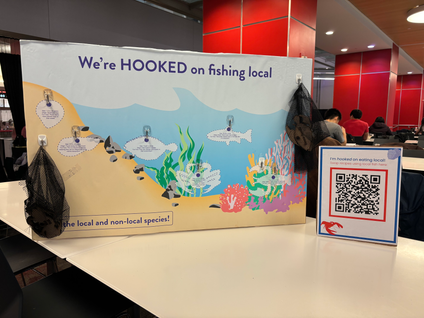top of page

How it Works
I'm Hooked on Fishing Local! is designed to stand outside of a high-traffic Whole Foods Market in Boston. Our team facilitates an activity that teaches shoppers how to identify local fish, as well as the environmental and economical benefits of buying local.
The board starts with six different laser-cut fish hung on hooks. Participants use the clues underneath the fish to sort them into "Local" and "Non-Local" nets.
I'm Hooked on Eating Local!
Our team goes over the results of the game, correcting mistakes when necessary, reviewing the benefits of shopping locally, and answering any questions.
We then direct participants to a QR code which is linked to a recipe sharing website (both mobile and desktop friendly). The site promotes cooking with local fish. This way shoppers can easily find ingredient lists right before they go into the store. Through fun and light-hearted teamwork, shoppers can make small choices to enact a big difference.

Marine Systems Issues in New England
This project was created to address and educate Boston locals on marine systems issues in New England. (Marine systems being defined as any ecosystems existing in saltwater habitats.)
To achieve this, our team created a physical interaction that fosters teamwork and community engagement.
New England Aquarium
Our team took a trip to the New England Aquarium to get a better understanding of the marine systems issues facing New England ocean life. Among the most pressing issues presented both at the aquarium and through secondary research are rising water levels, pollution, and, above all, climate change.
New England marine life is dwindling due to increasing water temperatures and loss of coastal habitats due to flooding. In terms of pollution, the Boston Harbor faces great risk from mismanagement of wastewater. The harbor has only recently become safe to fish and swim in after billions of dollars and 50 years.

How Do We Engage the Boston Community?
After learning about the potential threats to New England's marine systems, we wanted to find a way to inform Boston locals about these issues and encourage them to be a part of their solutions.
It can be hard, however, to understand how individual actions can enact greater change, even in just one city. As we come to terms with the effects of climate change and pollution in every facet of daily life, it is easy to become afraid and overwhelmed. Instead of instilling fear and paralysis in our audience, we sought to inspire hope through achievable actions.
Initial Ideas

As we looked towards positive solutions, we felt that it was important for users to have fun interacting with our project. Additionally, we wanted locals to feel a sense of community, so they don't feel alone in their efforts.
After sketching roughly 40 ideas, we chose to move forward with the three strongest ones, combining like concepts in the process. We then participated in a peer and mentor critique, where it was clear that Creature Sorting resonated the most. Reviewers liked the idea of a physical sorting game but felt that the categories were confusing and overly complicated.
We initially thought we might install this interactive display either at the New England Aquarium to appeal to visitors or on Northeastern University's campus to educate college students. Peers felt that there wasn't a clear intention behind these locations besides convenience, which is something we took into account for our final iteration.


Prototyping and User Testing
Click to Expand
Building off of our creature sorting sketch, we created a series of prototypes and conducted three rounds of user testing.
Our initial iterations focused on two different components: the mechanics of the creature sorting activity and a call to action to spark further interest and action. For our call to action, we debated handing out free stickers and pins with pro-local messaging or creating physical books to give away.
Our most important decision, though, was to change sorting categories to "Local" and "Non-Local." Instead of focusing on invasive species, which our audience might feel detached from, we chose to frame our project as promoting local fish. Buying local fish not only benefits local marine systems by lowering carbon footprints but also supports the local fishing economy. This decision led us to stage our product at Whole Foods, which services not only tons of college students but also a diverse population of permanent residents.
User Testing
User Testing
Alongside regular peer review and critique sessions, we conducted three rounds of user testing. One using a simple paper prototype, and two using versions of the final board.
Round 2
Round 3
Participant Feedback
Participants found the experience overall engaging and educational, and were surprised at how much or how little they knew. They also liked the clarity of our message, which outlined easy ways to make a difference.
Next Steps and Limitations
I'm Hooked on Fishing Local! was prototyped and tested within 6 weeks, and could be brought to the next level in further iterations.
We found that participants were scanning our QR code for the recipe website, but engagement largely ended there. They also didn't mention their experience with the site beyond a few words. While the website tested well, change would be needed to take it to the next level.
We also did not have the chance to test our interactive experience with a wide demographic, mostly encountering college students and young adults. While the Whole Foods we chose serves students, plenty of local community members shop there as well.
That being said, we certainly piqued our audience's interest with our project, which has great potential to enact realistic, everyday change.
bottom of page






